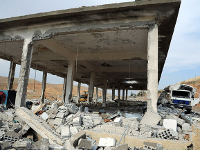Israel obediently serves NATO interests to strangle Syria
Another episode of exacerbation of Syrian-Israeli relations has stirred up the situation in the Middle East again. The conflict in Syria could not but affect the relations between the two neighbouring countries. Israeli neutrality was gone after a series of Israeli air strikes on artillery depots and barracks of Syrian divisions.

Of course, other major regional players, such as Hezbollah, took advantage of it by intensifying the activity of Palestinian militants in the Golan Heights. Hassan Nasrallah then announced an intention to open a second front in the Golan Heights against Israel. This may pose a serious threat to Israel, along with the development of Hamas on the Sinai Peninsula. What is the point of this sacrifice and why provoking primary enemies that can fire tens of thousands of missiles into Israeli territory?
The answer is obvious. Using the fact that Assad has shown no desire to respond directly to Israeli provocations, Israel decided to win direct support of Syrian "rebels" to clear the way for further intervention of the Western coalition. Benefits from Assad's possible departure are obvious - he is the main ally of Iran and of the side that actively supports Hezbollah.
Despite popular beliefs about Israel's fear of the coming of radical Sunni Islamists to power in Syria, it becomes clear that any Islamic radical group is quite easy to manipulate. Such groups remain under the control of specific forces and their ideology, just like their activities, is directly related to their wishes and financial possibilities. To crown it all, "opposition" fighters in Syria may not count for victory, and the only way to eliminate al-Assad is to conduct direct military intervention in the course of events.
However, even having all this in mind, the West is unable to carry out such aggression and dot all i's with the independence of Syria, and possibly Iran, due to Russia's stance on the problem and excessively high costs and potential losses. The only thing that the West can do is to keep the flame of opposition inside Syria, supply weapons to Syrian "rebels", and continue to prepare for a possible intervention.
This is exactly what Israel has been engaged into lately. It also explains Israel's fear to see Russian S-300 systems in Syria. Should the systems appear in Syria, Israel can be deprived of the ability to strike individual attacks on Syria. According to unconfirmed reports, the missiles, destroyed by IDF on July 5 (the missiles were allegedly launched either from S-300, or Bastion complexes) clearly posed no threat to the national security of Israel, but could be an obvious obstacle to intervention.
The media controversy that occurs after every new portion of information about attacks from Israeli, calls the power of Syrian air defense into question and casts doubts on the need of high spending for NATO members to suppress Syrian air defense, if necessary.
There is still a possibility that Syria and Iran, together with Hezbollah and Hamas, will dare to retaliate after another Israeli provocation. This will be a direct reason for the West to start a war. What is the Israeli administration thinking about, putting fellow citizens under rocket attacks?
It is worth noting that Israel stands strongly opposed to Assad's counter-terrorist operations in the border regions with Israel, while the Egyptian army received an approval from Israel to deploy large forces in Sinai to eliminate Hamas activists there.
Of course, if the Israeli authorities did not feel the support from across the ocean, they would go to talks with Iran. Israel could, probably, solve the disagreements with Iran in terms of its nuclear program, not to mention other long-standing problems. It is also quite possible that Israel would even be able to support Assad in this case, in the war against foreign terrorists. Alas, Israel only plays the role that it has to fulfil by virtue of its geographical position in the region for the sake of global interests of larger geopolitical players.
Alexander Serdyuk
Pravda.Ru
Subscribe to Pravda.Ru Telegram channel, Facebook, RSS!


